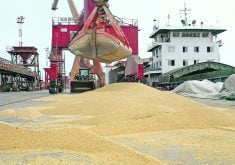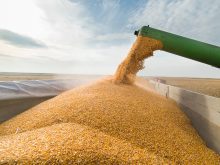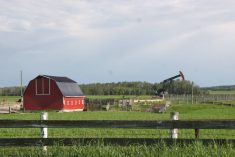The second Northern Plains Producer Conference ended with lots of talk about Canadian and American producers working together so farmers could share the benefits of the North American market.
But while there were few joint policy statements on contentious issues, those attending the conference said the call to work together across the border was important because it was a rebuke to those opposed to trade.
“There are some groups in South Dakota that would try to shut down the border and use the threat to our food supply (because of bioterrorism fears) as a reason to do that,” South Dakota agriculture secretary Larry Gabriel said in an interview.
Read Also

Flax sector sees omega-3 opportunity
SASKATOON — A global shortage of omega-3 oils could be an opportunity for the flax sector, says an industry official….
“Some are saying this is a reason to not import any food into our country.”
Gabriel, who supports cross border trade so long as it is fair trade, said there are always grumblings in his state about Canadian imports.
“Some of my cattle producer friends say we’d be better off without NAFTA (North American Free Trade Agreement),” said Gabriel, a cattle producer.
“They cuss it all the time.”
Gabriel said he believes trade generally benefits his state’s farmers, though cattle and hog producers probably don’t believe so.
“What they don’t realize is that if we don’t let people import, we might not be able to export,” Gabriel said.
“Exports are important.”
The conference brought together farmer representatives and politicians from Minnesota, North Dakota, South Dakota, Saskatchewan and Manitoba. The first conference occurred two years ago in Fargo, North Dakota.
In two days of meetings, farmers discussed how to standardize regulations for livestock movement and for pesticide approvals, as well as how to approach the introduction of genetically modified crops.
Producers from both sides of the border heard disputes over such topics as GM crops and intensive livestock operations. They weren’t disputes between Canadians and Americans, but rather homegrown conflicts that appear to be common across the northern Great Plains.
Farmers on both sides of the border were worried about the lack of public funding for research, the lack of control they have over GM crops, about not having the same access to chemicals as farmers in the other country, and about the need for a unified farm voice.
“One of the weaknesses we have as producers is we often don’t agree,” Keystone Agricultural Producers representative Chuck Fossay said during the meeting.
Saskatchewan agriculture minister Clay Serby was also frustrated by the difficulty of finding a united farm voice to get farmers more influence in society.
“Who is that voice?” he asked.
“Who is speaking for agriculture in Canada and the U.S?”
He said his province has dozens of farm and commodity lobby groups.
North Dakota agriculture commissioner Roger Johnson said the conference was useful for politicians who have to make legislation, but need to know farmer concerns first.
Manitoba agriculture minister Rosann Wowchuk said government decisions on agriculture must come from the grassroots.
She said more discussions between Canadian and American producers will help smooth agricultural trade, even if producers disagree on issues.
“We will not agree on everything. But we can learn about each other.”















